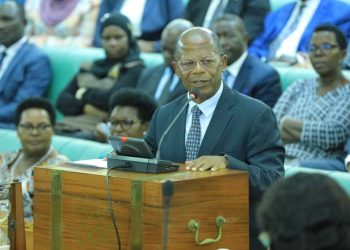After days of heated debate, Parliament on Wednesday passed the Landlord and Tenant Bill, 2018, to regulate the relationship between tenants and landlords.
The majority of the provisions of the Bill finally passed seek to address the issues relating to the tenants occupying commercial buildings in Kampala City and other urban areas that have for long been of contention.
The issues that generated a heated debate included demand by some landlords for tenants to pay rent in US dollars, subjecting a tenant to annoying treatment, rent increment, security deposit, fees for extra services, forceful eviction, termination of tenancy and confiscation of the tenant’s property for failure to pay rent.
While most MPs argued that most provisions in the Bill were favoring tenants against landlords, the mover of the Bill, the Minister of Lands, Housing and Urban Development, Betty Amongi, fought to ensure that the provisions are retained and she was largely successful.
A host of amendments that the MPs on physical infrastructure committee that scrutinized the Bill had recommended for deletion from the Bill were eventually retained. The committee chairman Kafeero Ssekitoleko was not able to move the House to accept the amendments.
Rent in US dollars
Parliament, after a heated debate, passed the provision prohibiting the payment of rent in dollars. In its report to Parliament, the committee had recommended that parties should be free to mutually agree to settle rent in any currency. But the House insisted that rent must be paid in Uganda shillings.

Landlord annoying tenants
The Bill passed states that a landlord who unlawfully subjects a tenant to any annoyance, especially after he has cleared the rent, will be liable to a fi ne not exceeding sh3m or imprisonment for a year or both.
State minister for housing Chris Baryomunsi said the move is intended to promote a cordial relationship between the landlord and the tenant. “Some landlords annoy tenants with the intention of evicting them. We know some landlords are rude and inaccessible,” he said, as MPs demanded to know how the annoyance will be determined.
The Speaker of Parliament, Rebecca Kadaga, observed that once a tenant has paid rent, they should be left to enjoy their space in peace. “This business of passing around, accessing the premises all the time, playing loud music, must stop,” she said.
Rent increment
Parliament also retained the provision in the Bill prohibiting landlords from increasing rent beyond 10% annually. The landlords will also be required to give a three months notice to their tenants before any rent increment.
“There are landlords who control many buildings in the country. “They connive and agree to increase rent by 200% and when the tenants fail to pay, they lock up their buildings. This law wants to cure that,” Baryomunsi argued.
Access to rented premises
The Bill also prohibits landlords from accessing rented premises without giving the tenant a 24-hour notice. The landlord will be fi ned sh2m or jailed for a year for accessing rented premises without notice.
Eviction of tenants
It will be an offense for a landlord to evict a tenant unlawfully. One who attempts to do so will be liable to a fine of sh5m or a year’s imprisonment, or both. But where criminality is involved, the Police and other authorities will be free to access the premises.
Security deposit
Under the Bill passed, a tenant will be required to pay a security deposit equivalent to one month’s rent, to cover for damages caused on the house by the tenant while occupying it. The security deposit will not cover normal wear and tear resulting from ordinary use of the premises.
The landlord will be required to refund the security deposit if the tenant does not cause any damage to the premises.
Rental agreements
It will be a requirement for a landlord and tenant to sign a written tenancy agreement where the rent is sh500,000 and above. But for tenants paying less than sh500000, the agreement may be verbal or by phone message depending on the parties.
“This threshold was set after consultation with Kampala City Traders Association members and other traders who complained that some landlords were avoiding paying taxes because there were agreements,” Amongi explained.
Failure to pay rent
The Bill allows a landlord to confiscate the properties of the tenant who fails to pay rent for purposes of recovering his rent. However, this will only be done after a court order.

Termination of tenancy
It is prohibited for a landlord to terminate the tenancy without a notice. The period for the notice will, however, be agreed on by the landlord and the tenant. But for a business tenancy, the termination notice will not exceed six months.
Extra fees for services
The new law allows a landlord to charge extra fees for amenities such as security. But these must be specified in the agreement signed.
Discrimination
A landlord is prohibited from refusing to rent premises to a person on the grounds of sex, race, ethnicity, religion, social or economic standing, political opinion or disability





























































